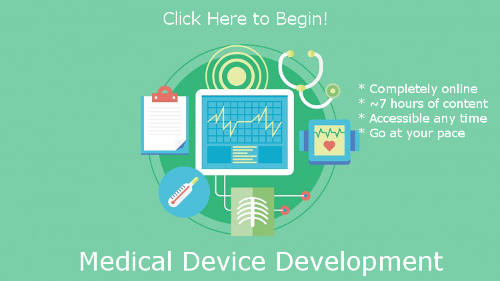Here are some questions that are commonly asked about taking medical device training courses through this site:
1. Do you have any classroom training or session in my Country X?
These courses are all completely online and can be taken from anywhere with Internet access. In-person seminars are available. However, the fees would include travel expenses and would be more expensive than the list prices for courses on this site.
2. How do the online/webinar training courses work?
The course lectures are all recorded and available through an interface at this website. You can watch them on your own time, any time you wish. There is no assigned time to meet online or in person. You go through the course material at your own pace. Each course contains about 5 to 7 hours of recorded video content, plus study materials.
3. How much time is needed for each course?
The Medical Device Development, Project Management for Medical Devices, and Advanced Medical Device Development courses each have 5 to 7 hours of content. The other courses/webinars are breakout pieces of the larger courses for those who do not want to spend as much time or cover such a wide range of subjects. They each have 1 to 2 hours of content.
4. Do these courses/webinars meet at fixed times?
No. All of the content is recorded and is completed at the student’s preferred pace. The only live portion of the courses takes place in the Medical Device Forums, where students and teachers post discussions. This, however, is not in real time. Posts are listed and answered at leisure.
5. What happens if a webinar if missed?
This is not possible. Since the lectures are all recorded, they are not live. At any time, a student can pull up and view any lecture from the course, and in any order.
6. What study materials will be provided?
For various lectures and modules in the course, there will be documents and/or web links to view. These will be provided along with the lectures. Often, the documents are templates for certain medical device development procedures or milestones.
7. Are there any examinations?
There are no examinations. Some of the courses have short quizzes to test your knowledge, but these are for your benefit.
8. Is there a certificate for completion of each course?
At the end of the course, you will receive a certificate of completion which you can print out. As this is a private company offering the courses, there is no college credit associated with them. However, the certificate can be used to add to a corporate training file which is an important folder often reviewed by ISO and FDA auditors. Having a certificate showing training in medical device development gives credence to the qualifications of the people listed on the project.
9. What are the benefits for participants in the courses apart from knowledge?
The benefit is learning a subject that is not taught in university: how to develop medical devices in the real world. This is not an academic course series. It is designed to teach a student how to do a job after university is complete.
These courses closely follow the series taught for 8 years at the New Jersey Institute of Technology (USA) and have received reports from former students that the subjects taught by the courses have helped them land jobs and score well on interviews. This is because the course materials allow them to ask and answer questions that are relevant to device development. It shows that the student has practical knowledge instead of just academics.
Many universities claim to offer courses on Medical Device Development, however in many cases those courses are taught by academics who have never developed or commercialized a device. These courses are taught by a 12-year veteran who has been part of nearly a hundred medical device projects spanning multiple fields of medicine from conception through commercialization.
The distinction between these courses and most of the courses taught in universities is easy to see from comparing the syllabi. The courses here show topics that are direct steps in the process of device development with real examples of document templates and true stories of pitfalls and successes in the field. Courses on medical device development taught by academics tend to lack these details and talk more about the philosophy of device development or the business aspects (for which they do not have the experience to teach most of the time either). Often, these courses leave that information out all together and simply focus on basic regulatory knowledge as if that was the sole aspect of developing medical devices. All in all, the courses here are experiential instead of academic, practical instead of theoretical.
